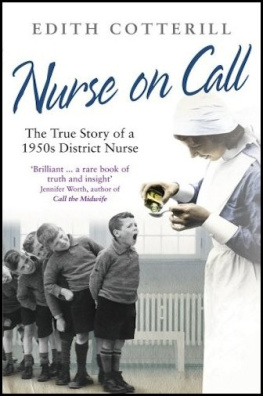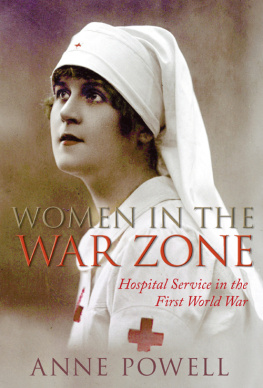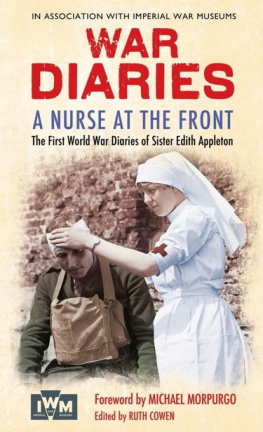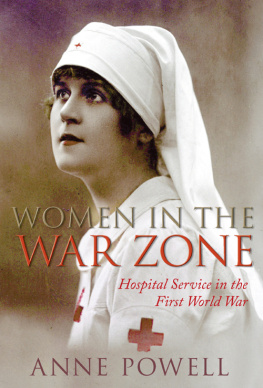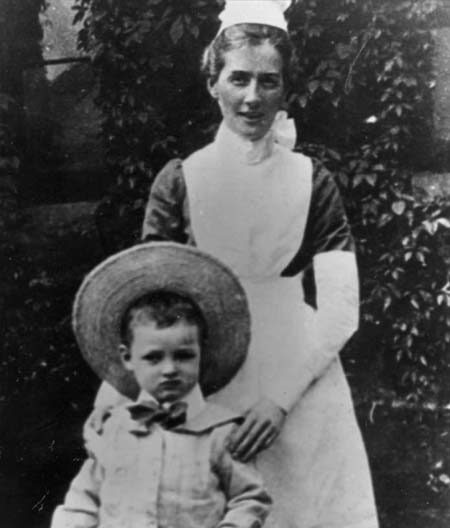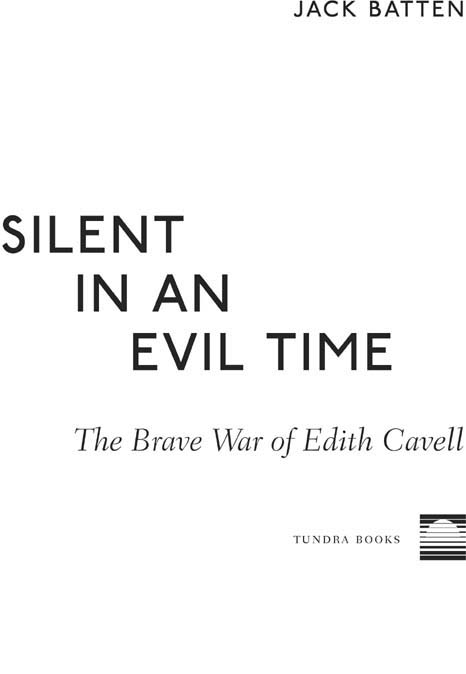CONTENTS
ONE
TWO
THREE
FOUR
FIVE
SIX
SEVEN
EIGHT
NINE
TEN
ELEVEN
TWELVE
FOR MADDY
____
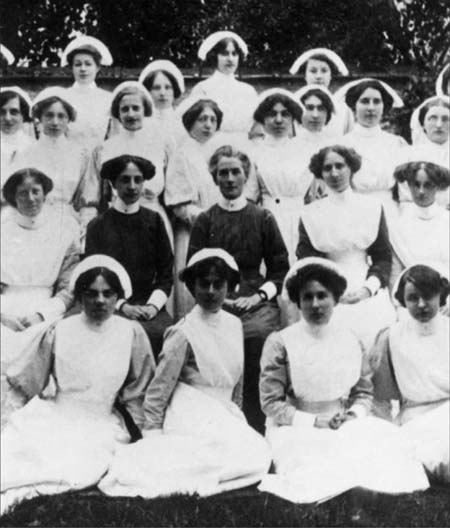
These young graduates from Edith's clinic became the first fully trained nurses to provide services in Belgium's hospitals, schools, and private nursing homes. (The Royal London Hospital Archives)
Chapter One
EDITH'S NARROW ESCAPE
E dith Cavell heard the crash of soldiers' boots at the front door below. The sound could mean only one thing the Germans had come to the clinic! Looking after a ward of patients on the second floor, Edith knew that she had no more than five minutes to get Arthur Wood out of sight. If the Germans caught an English soldier among the clinic's patients, Edith would lose her freedom and possibly her life.
It was a February morning in 1915, six months after the Germans occupied Belgium in the invasion that began the First World War. Edith, an English nurse, lived and worked in Belgium's capital city of Brussels, where she ran the country's only training clinic for nurses. Unknown to the German occupiers, Edith was using the clinic to smuggle British soldiers back to England.
Hundreds of the soldiers were caught behind enemy lines during the German advance through Belgium, and Edith joined a secret organization dedicated to hiding the soldiers and guiding them north to the Dutch border, on a route that took them home. On the February day when the Germans made their surprise visit to the clinic, one of the escaping Englishmen was with Edith in the second-floor ward. The soldier was an army private named Arthur Wood.

Edith thought of Wood as a special case among the dozens of soldiers she had already helped to escape. He was barely twenty, and looked even younger. With his smooth innocent face, Wood could be mistaken for a boy in his middle teens. An energetic young man, impatient after several days concealed in the clinic, he was keen to be on his way to Holland. Edith put Wood to work as an orderly to keep him occupied during his restless wait. He handled simple duties, assisting the nurses as they tended to the sick and injured Belgian citizens. And he was doing precisely that when the sound of German soldiers echoed from down below.
Arthur froze.
Be quick, Arthur, and do what I tell you, Edith said. And please stay calm. Edith, herself, was always calm. She was also a fast thinker.
She told Wood to remove his clothes down to his underwear and to put on a hospital gown. As he followed Edith's instructions, she turned back the covers on an empty bed and motioned him to climb underneath them.
The crack of German boots became louder. Edith knew that the soldiers had started up the stairs from the first floor.
Stay in the bed, Arthur, she said. You are going to be a patient. Please see if you can act like a person who is sick. But whatever you do, Arthur, don't open your mouth.
In appearance, Wood could pass for an ordinary Belgian kid, but he could never talk like one. He spoke little French, which was one of Belgium's national languages, and he certainly knew no German.
The sounds of the German soldiers told Edith that they had reached the top of the stairs. She placed a screen around Wood's bed. Then she turned to the door, just as a German officer and his soldiers entered the ward.
Edith was sure that German officials hadn't caught on to the secret activities that were happening in the clinic. She and the others in her organization were careful to keep the English soldiers out of sight. The Germans must be making this unannounced call to show Edith that they were in charge in Brussels. German soldiers were running the city, and they could barge in anywhere they wanted.
Yes? Edith said to the officer in French. How can I help you?
The officer was brisk and demanding. He let Edith know who was giving the orders. He said he intended to inspect the ward. In fact, he was going to take a tour of the entire clinic. Edith informed him that all of the patients were Belgians. The officer walked around the ward, looking at the men in the beds, asking them questions about their health. The patients answered in few words. As the officer checked the men, he seemed to accept that nothing was out of the ordinary.
Then he came to the bed with the screen around it.
The boy in this bed is far too ill to be disturbed, Edith said. She was polite, but firm. He cannot possibly answer questions.
The German officer said he would make his own judgment about that. He pulled back the screen and peered in. Arthur Wood was playing his role. His heart may have been pounding, but he lay under the covers, eyes closed, his face still. He looked younger than ever, and he was giving his best imitation of a very sick boy. The officer hesitated, taking all the time he needed to satisfy himself that the young man in the bed was who he was supposed to be a Belgian patient in a ward at Edith Cavell's clinic.
A minute or two ticked by while the officer examined Wood from the bedside. Edith was tense. She had no idea what the officer could be looking for. All she knew was that he was making her anxious, though she showed no sign.
Finally, the officer appeared satisfied. He stepped away from Arthur's bedside and turned toward the door. Edith hurried to put the screen back in place while the officer led his soldiers out of the room and off to inspect the other wards.
While the Germans completed the rest of their rounds, Edith followed. She knew that the danger hadn't passed; other escaping British soldiers were hiding in the basement. But, to Edith's relief, the German officer checked only the top floors. His tour lasted almost an hour before he and his soldiers finally marched out of the clinic's front door.
In the ward on the second floor, Arthur Wood hopped from the bed behind the screen. His heart had stopped racing, and he wore a broad smile. Edith told him he had done a fine acting job, and he should feel proud of himself. Wood wanted to hug Edith, but she was as old as his mother, not someone he should wrap his arms around. He thanked her sincerely, and that was enough.
A few days later, a man in Edith's secret organization guided Wood to the border. He had no trouble crossing into Holland, and within a week, he was home in England, reporting to his army regiment.

Back in Brussels, the close call with Arthur Wood didn't stop Edith from carrying on her dangerous work. In the months that followed, hundreds of other British soldiers fleeing the Germans came through the clinic. Edith had more close calls, but she never hesitated to take whatever risks were needed to save each one of her soldiers.






